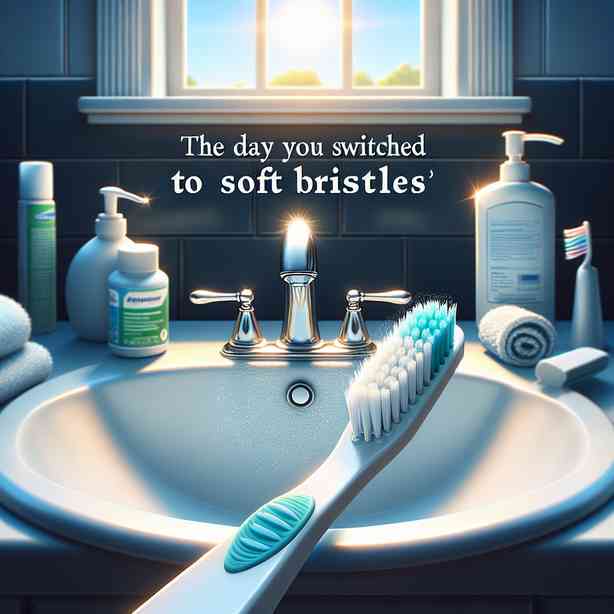
The decision to switch to soft bristle toothbrushes is a significant one that can have a profound impact on your oral health. Many people may have grown accustomed to using medium or hard bristles, believing that they provide a more thorough clean. However, understanding the benefits of soft bristle brushes and how they can promote healthier gums and teeth is essential. This transition may seem minor at first, but it encapsulates a broader understanding of dental care and hygiene.
To begin with, it’s important to recognize the damaging effects that harder bristles can have on the teeth and gums. Medium and hard bristles can exert excessive force on the delicate gum tissue, leading to receding gums and increased tooth sensitivity over time. The aggressive scrubbing action can wear down enamel, the protective layer of your teeth, making them more susceptible to cavities and decay. By opting for a soft-bristle toothbrush, you choose a gentler approach that prioritizes the health of your gums while still effectively cleaning your teeth.
Soft bristle toothbrushes are designed to be gentle yet effective. They have the ability to remove plaque and food particles without causing unnecessary trauma to the gums. Dental professionals often recommend soft bristles for their protective qualities, especially for individuals with sensitive gums or those who are prone to gum disease. This transition emphasizes the importance of using the right tools in your oral hygiene routine, embodying a more thoughtful approach to personal care.
Moreover, soft bristles can also enhance your overall brushing experience. Many users have reported that switching to soft bristles has led to a more comfortable brushing routine. This comfort encourages longer brushing sessions and more consistent oral hygiene practices. When you feel good about your dental care routine, you are more likely to adhere to it regularly, fostering long-term habits that contribute to better oral health.
In addition to comfort, the design of soft bristle toothbrushes often includes rounded bristle tips that are less abrasive compared to their harder counterparts. This design feature minimizes the risk of gum irritation and ensures that your brushing does not lead to unnecessary pain or discomfort. Alongside this, the flexible nature of soft bristles allows them to conform to the contours of your teeth and gums, reaching areas that may have been neglected with harder brushes. This adaptability ensures a thorough clean while being gentle on oral tissues.
Another vital consideration is the role of toothpaste in your oral hygiene routine. When using a soft bristle toothbrush, pairing it with a fluoride toothpaste can enhance the cleaning benefits. Fluoride helps to strengthen tooth enamel, while soft bristles effectively remove plaque, creating a synergistic effect that boosts your oral health. This combination aligns perfectly with the recommendations from dental associations, which emphasize the importance of both brush and paste for optimal dental care.
Transitioning to soft bristle toothbrushes can also have a positive psychological impact. When you notice improvements in your gum health, such as reduced bleeding during brushing or a decrease in sensitivity, it creates a sense of achievement and motivates further commitment to oral hygiene. This positive reinforcement reinforces the idea that taking care of your mouth is a priority, leading to better long-term outcomes.
Furthermore, selecting the right toothbrush is just one aspect of your dental care regimen. It’s equally important to consider other factors such as flossing and regular dental check-ups. Flossing daily complements the benefits of brushing by removing plaque and food particles that a toothbrush may miss. Establishing a comprehensive routine that includes soft brushing, flossing, and regular dental visits greatly enhances your chances of maintaining a healthy mouth.
As you continue to explore the advantages of soft bristle toothbrushes, you may find it helpful to engage in conversations with your dentist or dental hygienist. They can provide personalized recommendations based on your unique dental needs and history. Consulting professionals can guide you in selecting the best products that will suit your individual situation, thus enhancing your overall dental strategy.
Moreover, it’s essential to replace your toothbrush or toothbrush head every three to four months, or sooner if the bristles become frayed. An old toothbrush loses its effectiveness, and frayed bristles can cause more harm than good. By committing to regular replacements, you ensure your brushing remains effective and contributes to your oral health.
In conclusion, switching to soft bristle toothbrushes can significantly alter your daily oral hygiene routine for the better. Not only do they provide a gentler and more comfortable brushing experience, but they also protect your gums and enamel, supporting long-term dental health. By combining soft bristle brushes with fluoride toothpaste, daily flossing, and regular dental visits, you create a comprehensive approach that prioritizes your well-being. This journey may begin with a simple switch, but it unfolds into a rewarding commitment to better oral health. Embrace this change and enjoy the profound effects it can have on your smile and overall health. The day you switched to soft bristles may well have marked the beginning of a more positive relationship with your dental care.


